The poisoned clouds that are suffocating the people of Iraq
Flames of burning gas that puncture the sky are not just killing the planet – they’re killing Iraqis. In oil towns blighted by this toxic air across the country, locals tell Bel Trew they fear for their future as, one by one, their friends and family are struck by disease

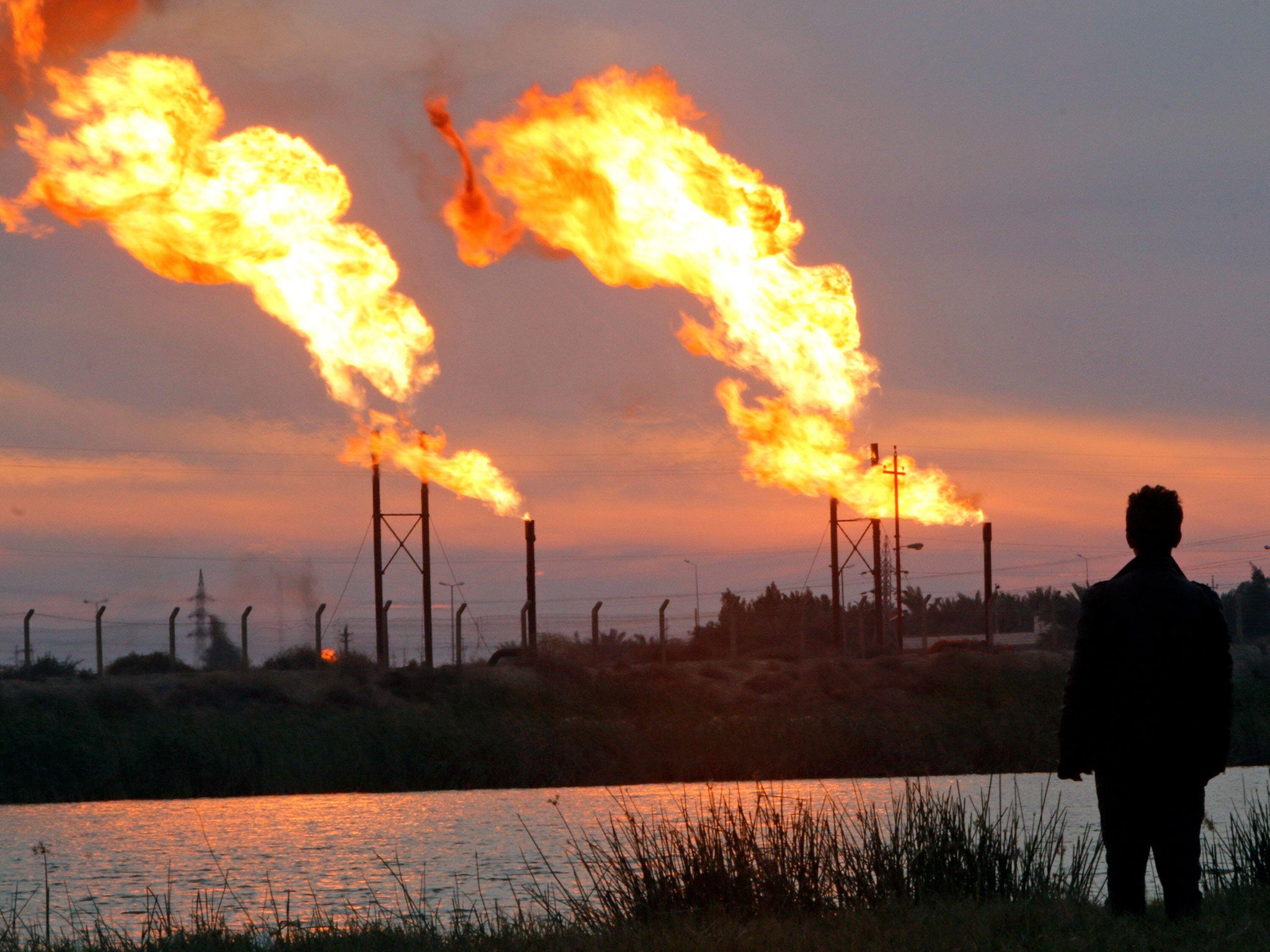
Your support helps us to tell the story
From reproductive rights to climate change to Big Tech, The Independent is on the ground when the story is developing. Whether it's investigating the financials of Elon Musk's pro-Trump PAC or producing our latest documentary, 'The A Word', which shines a light on the American women fighting for reproductive rights, we know how important it is to parse out the facts from the messaging.
At such a critical moment in US history, we need reporters on the ground. Your donation allows us to keep sending journalists to speak to both sides of the story.
The Independent is trusted by Americans across the entire political spectrum. And unlike many other quality news outlets, we choose not to lock Americans out of our reporting and analysis with paywalls. We believe quality journalism should be available to everyone, paid for by those who can afford it.
Your support makes all the difference.On the bad days, when the chimneys roar so intensely that the windows shake, families say thick soot appears in the air, killing plants and dusting everything a volcanic grey. For the inhabitants of Nahran Omar, a town in southern Iraq perched next to several oil wells, the flames rising from the towers, belching toxic chemicals into the air, are their daily reality.
This controversial practice of flaring – burning excess gas produced during the extraction of oil – is a major contributor to the climate crisis, experts say, but also a deadly threat to those who live nearby. The pollutants released have been linked to asthma, lung and skin diseases, and cancer.
Iraq is one of the biggest offenders in the world for flaring, and Basra – the province in which Nahran Omar is located – is the country’s worst-affected area.
Funded by our Supporter Programme, The Independent spoke to inhabitants who warn that the practice is killing children and the elderly, the weak and the fit. Though it’s hard to prove a direct link between specific illnesses and the flares, there has been a 50 per cent spike in cancer rates over the last decade, according to the town’s mayor, who says there are as many as 150 cases within the 1,600-strong community.
Muhammed Hassan, 43, whose 14-year-old has bone marrow cancer, tells The Independent: “When I went to the doctor with my son, whose spine was curved and skin was pale, he asked me where I live. I said, ‘Nahran Omar,’ and he said, ‘You don’t need to say any more. I understand this is because of the pollution.’”
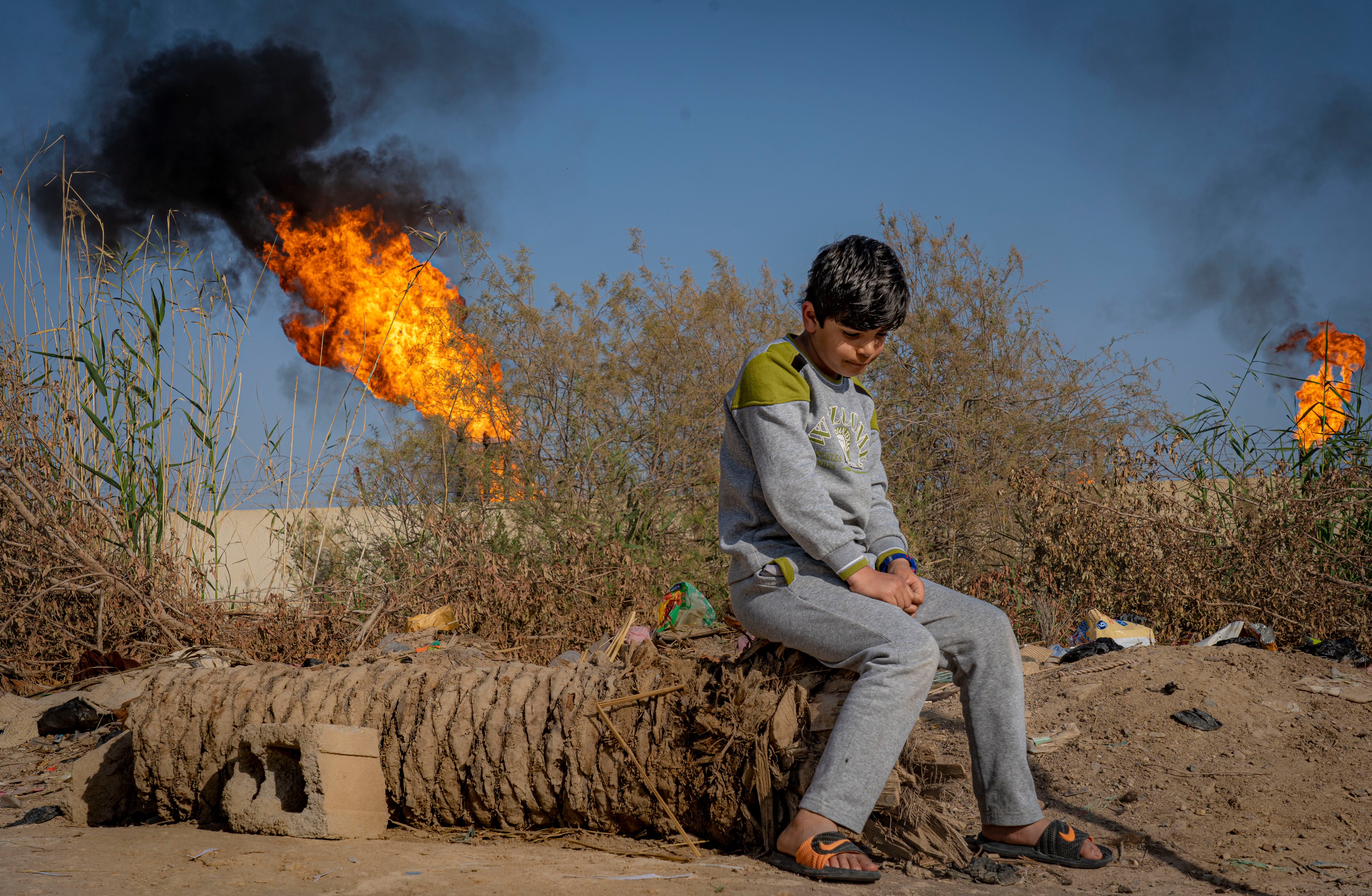
Holding a photo of his son, whose body is folded painfully in a wheelchair, he says he is more worried than ever this year because of the pandemic. A recent report by the European Society of Cardiology estimates that 15 per cent of coronavirus deaths are associated with air pollution.
“My son’s immune system is already compromised by his treatment, which is so painful he begged me to let him just die,” he says. “Everyone in the family wants to leave. We are extremely worried about our health.”
Against the deafening roar and astonishing heat of the towers, the mayor, Basheer al-Jabari, says most of the town suffers some kind of ailment. His own sister is one of those with cancer.
“When the chimneys start to increase their production or the filters are broken, you cannot imagine the big, dark, heavy clouds, which, when it rains, coat us with corrupted sooty water,” he says. “It pollutes the air, the water, the ground; we can’t even grow plants. Everything just dies.”
‘Change before it’s too late’
Across the country, the night sky is illuminated by flare stacks, which pump out greenhouse gases such as methane as well as local air pollutants, including nitrous oxide, sulphur dioxide and soot, that cause myriad health problems.
Iraq burns just over 17 billion cubic metres of gas a year, according to the World Bank’s latest data – second only to Russia as the country that flares the most gas on the planet. The resulting CO2-equivalent emissions equate to just under 10 per cent of total global output.
And so, though the country has limped through almost two decades of war, Jassim Abdulaziz Humadi, the deputy minister of environment and health, ranks air pollution as one of the biggest crises Iraq is facing. The Global Burden of Disease study, the world’s largest public health survey, even found that more people have died from air pollution than conflict since the 2003 US-led invasion of Iraq.
This is a “catastrophe”, says Ali al-Saffar, from the International Energy Agency, who believes this gas should instead play a major role in meeting Iraq’s electricity needs, particularly as it is one of the countries most vulnerable to the impact of climate change. Iraq is one of the rare countries that burns gas while also importing it.
“There are academic studies that suggest that Iraq’s average temperature is rising at two to seven times the global average,” he says. “For Iraq this issue is not theoretical ... The rising temperatures will bring increasing drought, water scarcity, and a great deal of misery. Iraq needs to be aware of the threat it could face and its gas riches need to be brought to better use.”
Basra alone is flaring more gas than Saudi Arabia, China, India and Canada combined, according to Wim Zwijnenburg, a researcher for the Dutch peace organisation Pax and contributor to investigative group Bellingcat. The area is home to the Rumaila oil field, the third-largest oil field in the world.
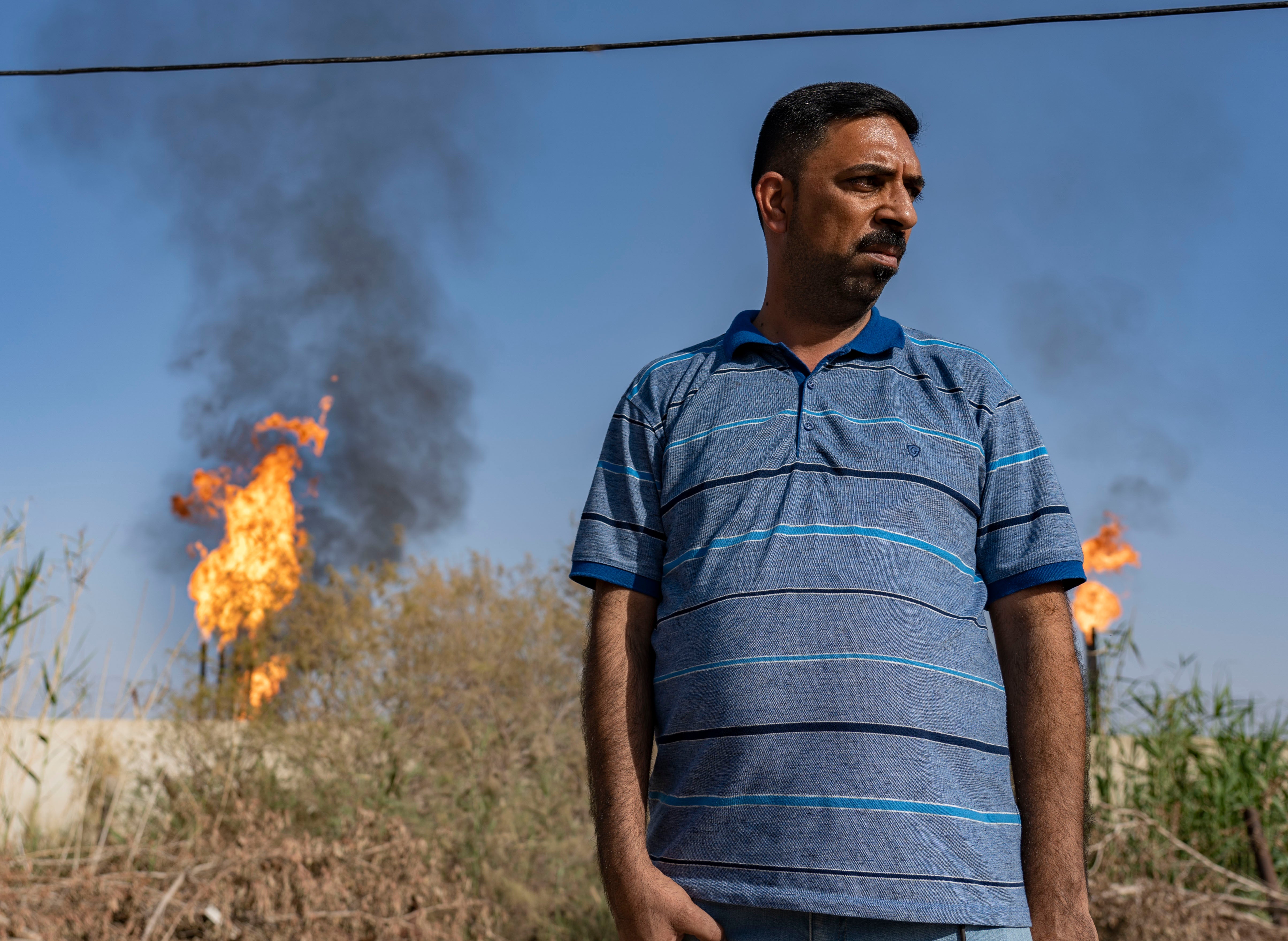
Together with Ollie Ballinger, a PhD candidate at Oxford University who specialises in remote sensing, Bellingcat released a report this week visualising the oil and air pollution in Iraq using satellite imagery and open-source data.
Zwijnenburg says the combination of flaring and other pollution related to the oil industry, such as dumping of crude oil and bad practices at informal refineries, is leading to an increase in temperatures, extreme weather events and wider environmental degradation.
“This will make areas like Basra unliveable in the next 10 years,” he says. “It’s the responsibility of all of the Iraqi government and the oil sector to change this before it’s too late.”
‘We can’t breathe’
It is not just Iraq’s oil heartland in the south that is choked by pollution. Ali, a 31-year-old guard at Qayyarah oil refinery, about 900km north of Basra, struggles to speak as he coughs.
“At night I cannot breathe. If there is no wind, it’s like a black smog descends on the town. I've been here for four years and have allergies now,” he says.
The entire area, 70km south of Mosul, was occupied for several years by Islamic State, whose fighters set fire to the main oil field as they retreated. That blaze burnt for eight months.
Like several areas in the northern part of Iraq, it is reeling from pollution caused by the conflict as well as the continued flaring. According to Zwijnenburg, the biggest surge in new flaring installations is in the north of Iraq. Satellite imagery shows at least six locations throughout the oil field near Qayyarah, which lies on the western bank of the Tigris.
The air smells toxic and, according to Ghazwan Mustafa, an engineer at the local oil facility, it has made many of the workers sick. He himself is a cancer survivor and says that 20 others working in the refinery have died since 2016 – something he attributes to the flaring. The Independent was unable to verify this claim.
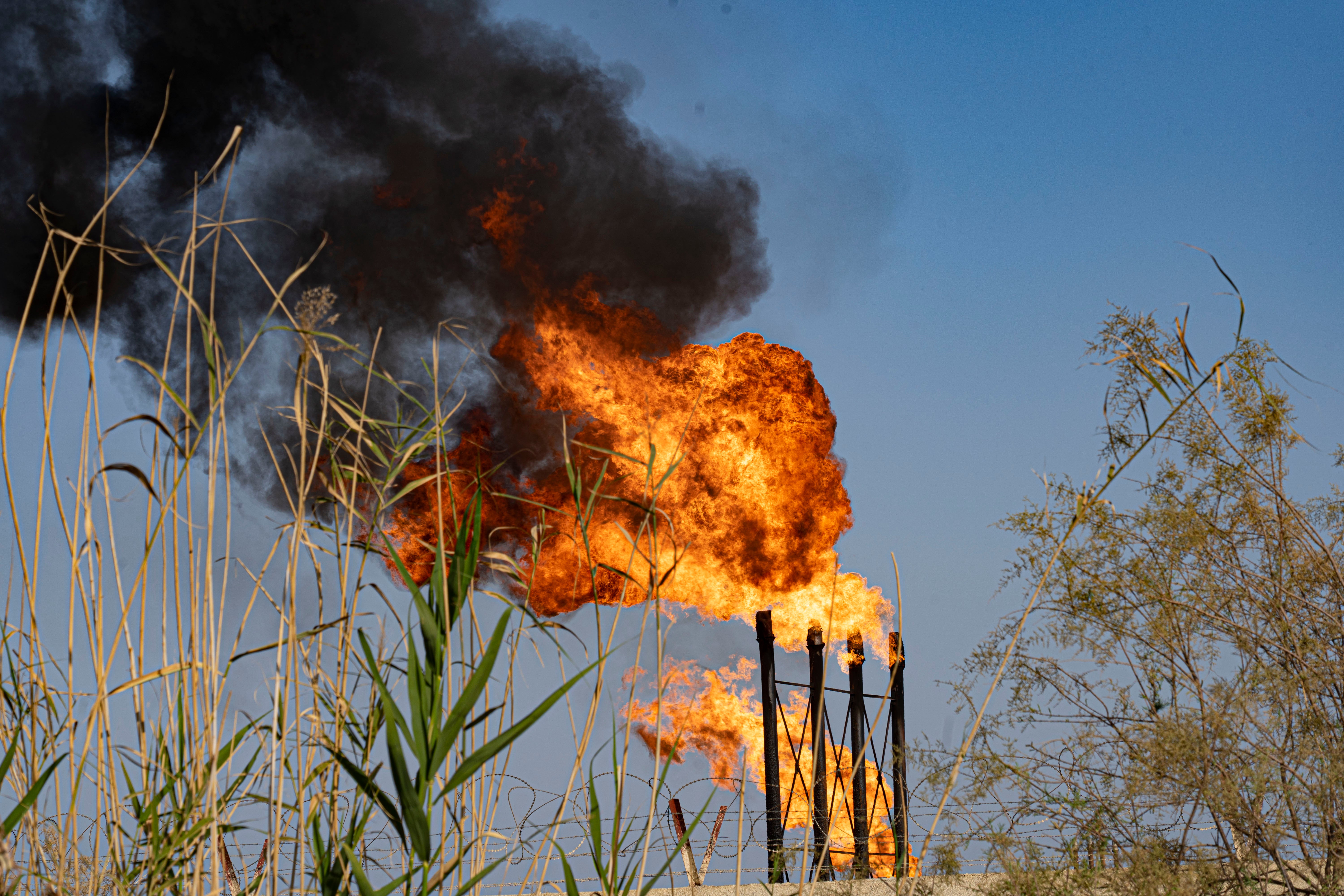
Speaking next to the refinery, he tells The Independent: “Yesterday you wouldn’t have been able to stand there because of the gas. We found dead birds. We have made so many protests, we have asked the government for help. We posted on Facebook, Twitter but no one listens.”
At Qayyarah’s main public hospital, Adnan Abdulrazek, a member of the hospital administration, says the most common complaints at the medical centre are respiratory and chest problems. He says the water supply has been affected by the soot, and water sometimes runs black from their taps. “We have written on Facebook, we have written articles, we informed the oil minister,” he adds. “We are always publishing videos of our atmosphere and no one listens to us.”
Meanwhile, workers in Baghdad refineries say they fear their lives are in danger from the pollution. One, who works for Daura refinery, says: “There are so many cases among the workers of being sick, because the filtering is very old, dilapidated, not suitable for the present time and the large quantities of production.
“But they are kept secret. Everyone is afraid and is trying to find another job. I have nightmares that I am injured.”
‘People will lose their way of life’
It is a cruel irony that so many people suffer from the burning of gas while Iraq, blighted by power cuts, still imports gas from abroad to power its electrical plants. In 2009, Shell estimated that the wasted gas could produce 3,500 megawatts per day – approximately 70 per cent of Iraq’s daily energy production.
The Iraqi authorities originally promised to halt all flaring by 2022, looking to capture it as a power resource instead. But environment ministry officials in Basra admit the deadline has since been pushed to 2025. Oil ministry officials say they are on track to meet that target, but for now, according to the World Bank, flaring is still on the rise.
However, there are signs of progress. Ali Hanon, of the health and environment ministry in Basra, tells The Independent his office has been working with oil companies on Nahran Omar specifically, including enforcing the use of effective filters, increasing the height of the gas-flaring towers, as well as better treatment of the oil lakes near the area.
In 2018, the authorities opened a new plant that recaptures about 10 billion cubic metres a year of associated gas from four of Basra’s 15 oil fields. The ministry told The Independent it is currently working to double that capacity.
Assim Jihad, an oil ministry spokesperson, says they are in the final stages of negotiations for several other plants with Chinese and US energy companies, including Baker Hughes, some of which would be operational by the end of next year.

Among the largest is a facility developed in collaboration with French firm Total that, if it goes ahead, could recapture between 3 billion and 6 billion cubic metres of gas a year from the Ratawi oil field. The deal, Jihad says, has been “tentatively agreed” and could put a significant dent in Iraq’s flaring.
Despite this movement, industry experts still believe the 2025 deadline is optimistic. There are unconfirmed reports of bitter feuds over the leadership of joint ventures that could see some deals fall through.
Jihad claims “it is a mistake” to directly connect all cancer cases near the oil fields to flared gas, saying there needs to be further scientific study of the causes. “There are other factors, like the impact of wars on Iraq since 1980 and the chemical and uranium weapons that were used,” he says.
In Baghdad, Jassim Abdulaziz Humadi, the deputy minister of environment and health, admits it has been an uphill battle. “Frankly speaking, there was no cooperation with the oil ministry at the beginning – we just kept continuing to nag,” he tells The Independent. But he says over the past five years his department has worked more closely with the oil ministry to combat climate change and air pollution.
He heads a national committee with non-governmental organisations and universities that are tracking the relationship between environmental pollution and public health, in particular whether there is a link to the surge in cancer cases and children born with birth defects.
The pandemic raging through Iraq has helped change perspectives, he says – and he hopes that will lead to investment in public health and protecting the environment.
“We are dealing with water security, food security, land degradation, desertification, increased instances of sandstorms to name a few,” he tells The Independent. “In the end, it might lead to the internal displacement of people and an impact on national security.”
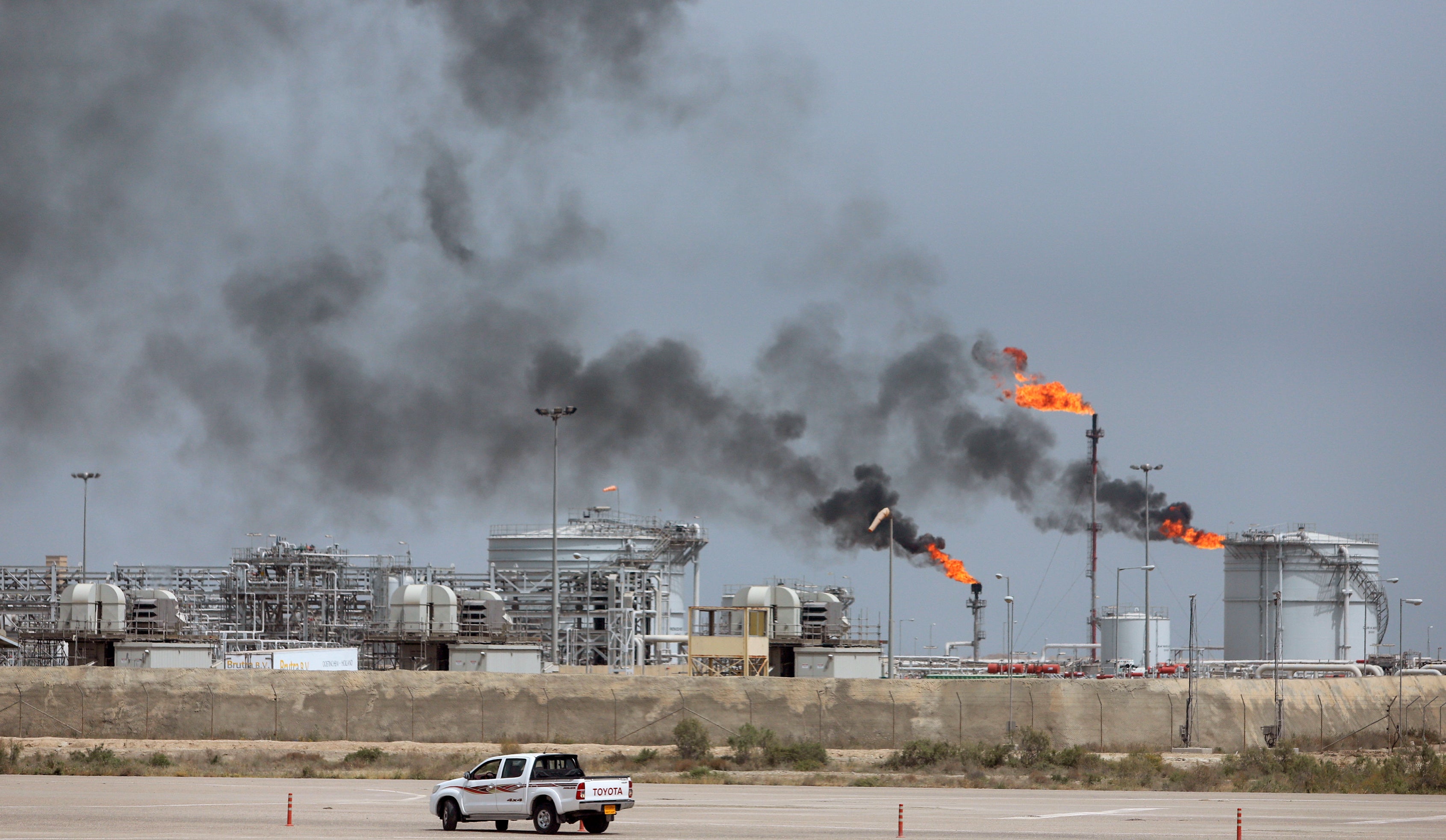
It’s a fear shared by environmentalists. “Everything has got worse since 2018,” says Esraa Falah, of activism group Tigris River Protectors Association. “There will be mass displacement. People will lose their living and normal life; they will have to change in their traditional way of living.”
Back in Nahran Omar, under the punishing heat of the flares, this subject dominates the conversations among the youth who are desperate to get out.
One, 18-year-old Mohamed, says that in the past four years his grandfather and his best friend, aged just 21, have died of cancer, while his uncle is in hospital with the disease.
“Everyone is worried about their health. I feel fear; everyone is afraid,” he says. “Everyone is trying to leave here, to leave Iraq and go abroad. We’re suffocating and need to get out before it’s too late.”



Join our commenting forum
Join thought-provoking conversations, follow other Independent readers and see their replies
Comments